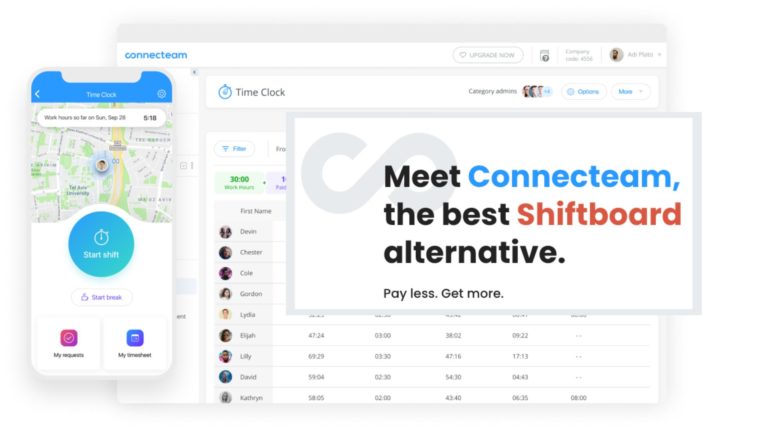Let’s discover what predictive scheduling is, how it impacts your business, and how you can best prepare for it and come out on top.
Predictive scheduling seems to be sweeping the nation, and it’s taking the guesswork out of scheduling for managers and employees alike.
But what is predictive scheduling, how will it affect your business, and how can you best prepare for it and come out on top?
Let’s dive in and find out!
What Is Predictive Scheduling?
Predictive Scheduling – also referred to as predictable, restrictive, or fair scheduling – is legislation designed to give shift employees more stability and certainty around their work schedules by requiring specific scheduling practices.
While predictive scheduling laws vary by state or municipality, some common aspects include:
- Advance notice: Employers must notify employees of their upcoming schedules a certain amount of time in advance. This often varies between 2-4 weeks.
- Predictability pay: Employers are required to pay staff additional compensation if they make schedule changes after the advance notice period is up.
- Rest periods: Employers must provide employees with a certain amount of rest time between shifts.
- Refusing or requesting shifts: Employees can refuse certain shifts or request schedule changes. Such requests must follow the requirements laid out in the law.
- Record-keeping: Employers are required to keep records of employee work hours, schedules, and other relevant information to ensure compliance.
How Does Predictive Scheduling Affect Your Business?
As an employer, you can find predictive scheduling to have positive and negative aspects, depending on your perspective.
Let’s break it down!
Efficient workforce management
Predictive scheduling requires tight planning. While this may require some extra effort, it pushes you to stay on top of your staffing needs in advance, allowing you to ensure you have the right number of qualified employees on shift to meet customer demand.
On the one hand, this allows you to avoid understaffing and, in turn, keep your business running smoothly and prevent reduced customer satisfaction and lost sales. On the other, it keeps you from overstaffing, saving you unnecessary labor costs.
Better retention and morale
Providing your employees with predictable schedules allows them to better plan their personal lives and maintain a work-life balance. Predictive scheduling further helps ensure your staff has time to rest and recharge between work days.
The result? Increased productivity and job satisfaction and reduced absenteeism and turnover. A win-win!
Potentially higher costs
Depending on your area’s specific predictive scheduling regulations, you may face added fees. This can include shortened rest period charges, on-call pay, and schedule change fees.
On top of that, failing to comply with predictive scheduling laws can result in fines, legal action, and damage to your business’ reputation.
Less flexibility
Predictive scheduling laws reduce scheduling flexibility by requiring you to publish your schedules further in advance and limiting your ability to make last-minute changes.
While this gives your employees more predictability, it also limits their ability to adjust their schedules at short notice.
Increased administrative complexity
As mentioned above, predictive scheduling laws often require employers to keep detailed records of their scheduling processes, employee work hours, and other relevant information. Administratively, this can be time-consuming and complicate workforce management.
Where Is Predictive Scheduling Implemented?
As of mid-February 2023, these eight major US cities have adopted predictive scheduling laws:
- Berkeley, California
- Chicago, Illinois
- Emeryville, California
- New York City, New York
- Philadelphia, Pennsylvania
- San Francisco, California
- San Jose, California
- Seattle, Washington
In addition, Oregon is currently the only state with a state-wide predictive scheduling law.
This list is bound to expand, with predictive scheduling legislation currently on the table in both Colorado and Los Angeles.
How to Prepare for Predictive Scheduling
These steps will help you prepare to face predictive scheduling requirements with confidence:
- Check local predictive scheduling laws to understand which requirements apply to your business.
- Review your current scheduling practices and make adjustments to ensure you comply with these laws.
- Use scheduling software that automates the scheduling process and ensures compliance with local legislation. A good scheduling tool, for instance, allows you to instantly share schedules with your employees and keep digital records of their work hours.
- Train managers on predictive scheduling, including the requirements for providing schedules and handling requests and changes.
- Communicate with employees about the changes in your scheduling practices and policies to ensure they understand their rights and responsibilities under the law.
- Analyze the impact on your business to ensure compliance while meeting your business objectives.
The Bottom Line on Predictive Scheduling for Your Business
Overall, you might either be excited to see the positive impact of predictive scheduling on your business and team’s productivity or absolutely dread its implications.
Either way, by being proactive and implementing the right strategies and tools, you can stay on top of your scheduling process, remain compliant with regulations, and even bring your business and workforce to perform on a whole new level.
An employee scheduling and management app like Connecteam is a great way to master predictive scheduling, giving you all the tools you need to simplify scheduling all around, record accurate work hours, and ensure full compliance. Use the AI scheduler to instantly assign open shifts based on employee availability, preferences, and qualifications.
Predictive scheduling made simple
Create optimal employee schedules, handle time off and shift change requests, record work hours, ensure full compliance, and more – all with Connecteam’s all-in-one app.



